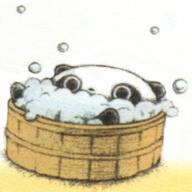如題
漁民0係生活上亦都有好多禁忌,例如0係船上面行唔可以著鞋,亦不比穿鞋0既人上船,因為疍民以船為家,佢地覺得身家性命財產都系在船上,絕對唔可以比鞋整dirty。所以,凡係對船不利的象徵性動作和語言都很避忌。
例如食野既時候,所有餐具都唔可以調轉黎放,食魚唔可以將魚返轉另一側黎食,忌說與“沉”福佬方言同音的字眼,忌打破屋內東西認為彩頭不好;忌說貓,認為捕捉的魚會被貓吃光;忌殺烏鯊,認為烏鯊會聞到死伴的腥味而在海裏復仇吃人。此外,最忌諱漁船或船屋沾上穢氣,佢地覺得會招來撞船或擱淺等不利事情。
所以就出現左一d禁忌例如:
(一)忌女人跨過船頭
(二)忌生左bb未夠1個月0既產婦過船或碰到自已的船隻。
(三)忌死屍從船頭上經過,恐怕其污染船頭,不利生產。
(四)唔比陌生人走去船尾。因船尾是掌舵的地方,怕沾上穢氣導致駕駛不靈。
隨著時代和科技的發展,捕漁業亦由興旺漸趨式微,香港漁民的傳統捕魚方式都起了很大的變化,加上不斷填海、收地,將漁農業邊緣化,以致漁農業走向式微。結果漁民紛紛上岸,入城從事其他行業,留守漁農業的莫不是餐搵餐食。
20分!可以幫我翻譯成英文嗎?
2007-05-13 5:18 am
回答 (4)
2007-05-13 1:28 pm
✔ 最佳答案
Fishermen have a lot of taboos in life. They cannot, for example, wear shoes on the boat or let someone wearing shoes board the boat. To the Danjia people, their boat is their home; all their lives and properties are on the boat and therefore cannot be dirtied by shoes. Therefore (I think it should be "moreover"?) any action or word that is symbolically unlucky to the boat is fastidiously avoided.Some examples are: during a meal, no utensils may be placed upside down; a fish cannot be flipped over; any word homonymous with "sink" in Fujianese is avoided; breaking anything inside the house is considered a bad omen; the mention of cat is avoided for fear that cats will eat the fish they catch; the killing of a lantern shark is also avoided because of the belief that a lantern shark will smell its companion's death and eat men as a revenge.
The fishermen are also deeply concerned about the fishing boat or boathouse becomes "unclean", as it will bring about bad things such as a collision or going aground. Hence came some taboos such as:
1. A woman cannot step over the bow.
2. A woman who gives birth less than a month ago cannot step on or touch a person's boat.
3. A corpse cannot pass over the bow, else it will contaminate the bow and hurt production.
4. A stranger cannot go to the stern. That is where the steering is and any uncleaniness can lead to bad steering.
Along with the advance of time and technology, the fishing industry has gone from prosperity to decline, and the traditional fishing method of Hong Kong fishermen has also changed drastically. Moreover, the continuous land filling and reclaiming has marginalized the fishing industry and leads it down the road of extinction. As a result, most fishermen move onshore and work in other industries in the city, and those who remain can only live from hand to month.
2007-05-13 7:16 pm
2007-05-13 3:40 pm
The fisherman is lives also all has many taboos, for example above 0moorages the line may not the shoes, also compared to not put on shoes0 already people to embark, because the people take the ship as afamily, they thought the lives and properties of an entire familyproperty all is on the ship, to may not compared to shoes entiredirty. Therefore, every is all very much evades to the shipdisadvantageous symbolic movement and the language. For example food wild already time, all tableware all may not transferLebanon to put, eat the fish not to be allowed to return the fishtransfer another side Lebanon food, the death anniversary said with"sinks" the lucky man dialect unison phrase, the death anniversarybreaks the room west to think the good luck is not good; Thedeath anniversary said the cat, thought capture the fish can eat bythe cat the light; The death anniversary kills the Ukraine shark,thought Wu Shahui smell the dead partner's fishy smell but to eat theperson in the sea revenge. In addition, most abstained from thefishing boat or the ship room stains the bad smell, they thought canincur hits the ship or reaches a deadlock and so on thedisadvantageous matter. Therefore appears the left d taboo for example: (1) envies the woman to bridge over the bow (2) Death anniversary生 baby not 1 month 0 already parturientwomen trans ships or bump into from already ships. (3) envies the corpse to pass through from the bow, fears itspollution bow, disadvantageous production. (4) does not walk compared to the stranger the stern. Because thestern is a place which operates the rudder, feared stains the badsmell to cause driving not to work. Along with the time and the technical development, prosperouslycatches the fishery also by gradually to hasten declines, the HongKong fisherman's tradition caught fish the way all to get up the verybig change, in addition unceasingly filled in the sea, receives,fishing agriculture edge, so that the fishing agriculture trenddeclined. Finally the fisherman comes ashore in abundance, enters thecity to be engaged in other professions, can it be that remains behindto take care of things the fishing agriculture meal found meal the food.
2007-05-13 5:22 am
Fishermen also have a lot of life taboos, such as the above-boat trip can take their shoes or shoes than both people aboard, and because Danmin to ship home, drainage feeling ill property on board, absolutely not the whole than shoes dirty. Therefore, any adverse ship to the symbolic actions and language are very evasive. For example, both boar, all the tableware can hardly reverse Li Fang, the fish can take the fish back to the other side of UNIFIL food, D'said "Shen" Additionally, a homonym of the word dialect, D'break things inside that bad luck; Ji said the cat, that catch the fish will be eaten all cats; prohibitions against killing shark Ukraine believes that Ukraine will press shark to death with the flavor of the sea and revenge cannibalism. Furthermore, the most taboo vessel or houseboat stained homes, drainage feel drawn to the collision or groundings, and other adverse events.
So there left an d taboos such as :
(1)Women across the bow
(2)Health bb not enough left a 0 on both the maternal sea or encountered own vessels.
(3)Dead from the bow, after probably its bow pollution, adverse production. (4) Wubi strangers walking wakeboarding. Wakeboarding is controlled by the fear of stained homes to driving problems.
Along with the times and technology development, the thriving fishing from the gradual decline Hong Kong fishermen's traditional fishing methods have undergone great changes, coupled with continuing reclamation and land, agriculture and fisheries marginalization, resulting in the decline of agriculture and fisheries. Results fishermen have landed into the capital for other jobs, rear agriculture and fisheries every one of them is quick meals menu.
So there left an d taboos such as :
(1)Women across the bow
(2)Health bb not enough left a 0 on both the maternal sea or encountered own vessels.
(3)Dead from the bow, after probably its bow pollution, adverse production. (4) Wubi strangers walking wakeboarding. Wakeboarding is controlled by the fear of stained homes to driving problems.
Along with the times and technology development, the thriving fishing from the gradual decline Hong Kong fishermen's traditional fishing methods have undergone great changes, coupled with continuing reclamation and land, agriculture and fisheries marginalization, resulting in the decline of agriculture and fisheries. Results fishermen have landed into the capital for other jobs, rear agriculture and fisheries every one of them is quick meals menu.
收錄日期: 2021-04-18 22:07:17
原文連結 [永久失效]:
https://hk.answers.yahoo.com/question/index?qid=20070512000051KK04932



